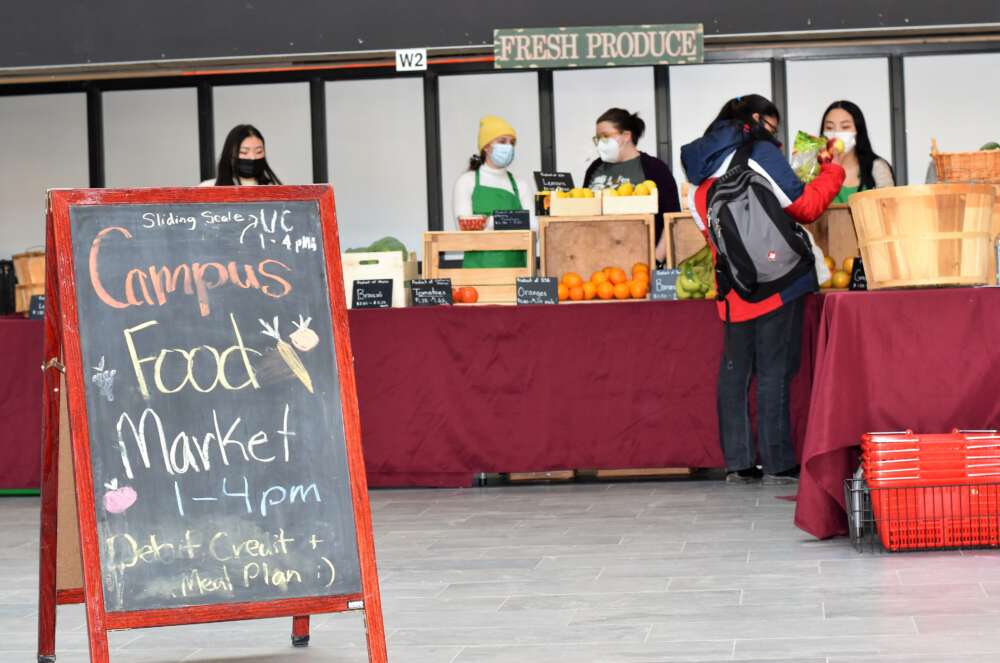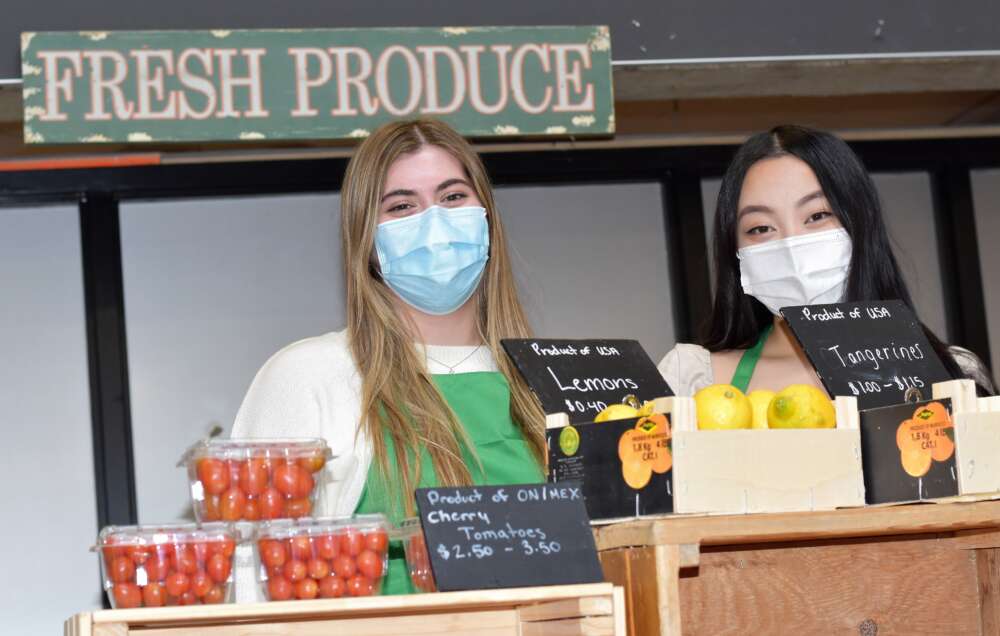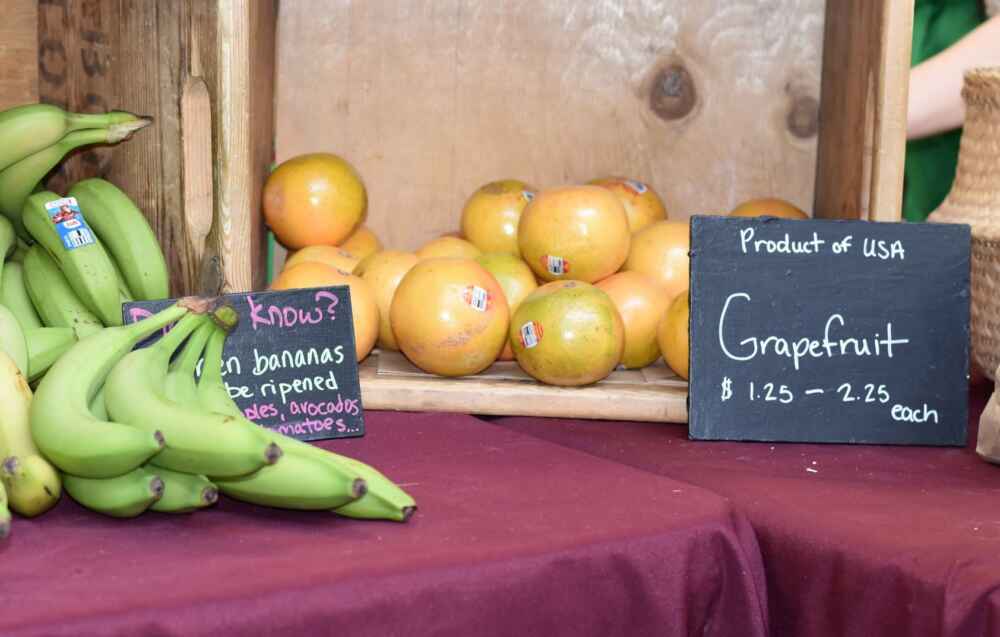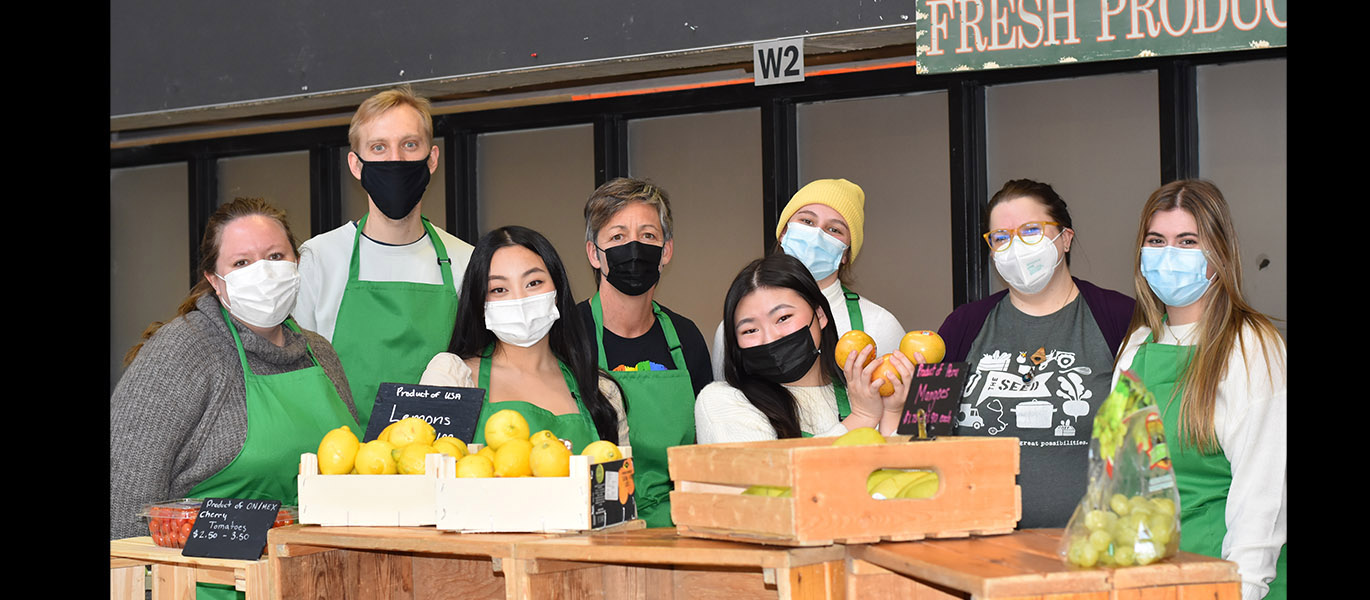
A new weekly community food market has launched at the University Centre that is bringing fresh fruit and vegetables to students at affordable prices.
Held every Thursday afternoon, the market is open to everyone in the University of Guelph community. Since launching earlier this month, the market has proven a hit, with customers lining up early with reusable bags to shop for fresh produce right on campus.
The market is the result of a collaboration between the Feeding 9 Billion initiative at the Arrell Food Institute, the GuelphLab within U of G’s Community Engaged Scholarship Institute, the Office of Sustainability and Hospitality Services.
All the fruits and vegetables are sourced via The SEED, a not-for-profit community food project at the Guelph Community Health Centre that buys produce at wholesale prices for its own community markets throughout the city.
Two students, Maya Nickle and Vivan Ma, were the driving force behind the market. Both are peer helpers with Feeding 9 Billion initiative, a food security initiative that conducts outreach and education in food, agriculture and global hunger.
Every item at the market is priced on a sliding scale

Inspired by The SEED’s community market, they along with their campus partners wondered whether they could bring a similar market to U of G.
“The SEED was a direct inspiration for this project and has partnered with us to help us run this market. We are so thankful to them for all their support and hard work,” said Nickle.
Every item at the market is priced on a sliding scale, ranging from near average-grocery store prices to 30-50 per cent less than store prices. Market visitors choose their items, take them to the check-out and are given a price range for their total. They choose what they’re comfortable paying within that range, no questions asked.
“The sliding-scale has been well-received and people really seem to appreciate it,” said Nickle.
Ma said while the food sold on campus is great, not everyone can afford or access it.
“Money is a huge factor when deciding when and where to eat on campus. When it comes to produce, students only have access to a limited selection,” she said.
Increasing students’ access to fresh fruit and vegetables

Everyone in the U of G community, including students, staff and faculty, is welcome to shop the market, with the hope that those who can afford to pay a little more will offset those who can’t pay full price, explained GuelphLab facilitator Sam Laban.
“Our hope is that the market will help increase students’ access to fresh fruit and vegetables in ways that uphold their dignity, while at the same time, creating an event to bring people together and build community,” he said.
To that end, organizers are planning collaborations with campus community groups for future market days.
On March 24, dietitians with Student Wellness will run a “smoothie social,” whipping up fruit smoothies while answering students’ questions about food and nutrition.
Also on the 24th, members of the Guelph Family Health Study will be on hand to discuss their new free, plant-based proteins cookbook and give away a meal kit containing all the produce and pantry items needed to complete a recipe in the cookbook.
“Having the market in such a public space has really brought everyone together and helped increase awareness of food security,” said Ma.
Laban said research conducted by the GuelphLab in 2019 with Meal Exchange, a national organization dedicated to healthy food access for students, found that 24 per cent of U of G students struggled with food security.
That includes 10 per cent who could be classified as severely food-insecure and who may have been regularly missing meals, said Laban.
“Food insecurity is a problem for many universities across Canada,” he said. “Reduced access to healthy food has impacts on students’ health and wellbeing as well as their academic performance, so that is why we were motivated to seek solutions.”
‘Unbelievable turnout at first few markets’
While the market wraps up April 7, organizers are hopeful the six-week pilot will be the start of a more permanent market, come the fall.
“The University of Guelph is on the forefront of using this sliding-scale community market model and it’s a trend that’s growing; the University of British Columbia just opened a similar market,” said Laban.
“There has been an unbelievable turnout for the first few markets,” said Nickle. “The U of G community has truly exceeded our expectations with the amount of support and attention this project is receiving.”
To stay up to date with U of G community food market and find out what available each week, follow @feeding9billion on Instagram.
Contact:
Sam Laban
slaban@uoguelph.ca
Jeanna Rex, Arrell Food Institute
jeannar@uoguelph.ca
